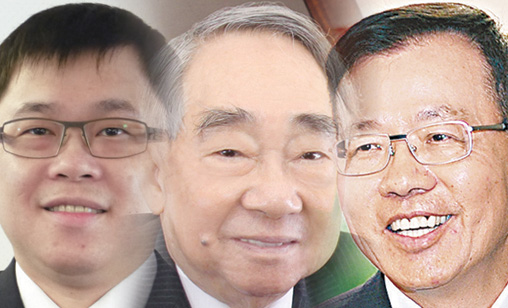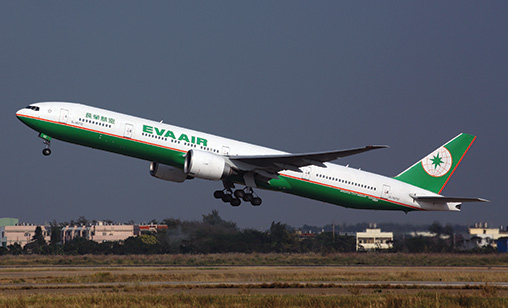News Backgrounder
An airline house divided
Events in the boardroom of EVA Air descended into soap opera last month when the Taiwan carrier’s newest chairman, and favoured son of the late founder, was ousted. A safe pair of hands, former chairman Steve Lin, has been installed at the airline to maintain order as the boardroom drama plays out.
May 1st 2016
When EVA Air’s then chairman and qualified pilot, Captain Chang Kuo-wei, flew out of Taipei’s Taoyuan International Airport on March 11, in command of the regular B777-300ER service to Singapore, he had no idea what he was leaving behind. Read More »
Within hours of his departure, the 45-year-old Chang, or K.W., the fourth son of the late founder of the Evergreen Group and its subsidianes, Chang Yung-fa, was on his way out of his day job.
 |
At issue was a family divided between the three older sons of Chang’s first wife and K.W, a son born of the tycoon’s second marriage.
The elder Chang died on January 20, aged 88. In February K.W. made his father’s will public. It had appointed him as successor and principal beneficiary. He had been chairman of the airline since 2013, but he immediately promoted himself to chairman of the entire Evergreen Group.
It may have appeared like a natural succession, but his three older half- brothers from his father’s first marriage, Chang Kuo-hua, Chang Kuo-ming and Chang Kuo-cheng, were far from happy.
So, with the youngest brother out of town, they seized the moment and convened an unscheduled board meeting at the group’s corporate headquarters. In just 30 minutes seven out of nine board members voted to replace K.W. with Steve Lin Pao-shui.
The company veteran was president of EVA in 2004 and chairman of the airline from 2005 to 2011. K.W. supporters were fired or reassigned and staunch ally, airline president Austin Cheng, opted for early retirement after more than 20 years at the carrier.
The drama is far from over with legal proceedings continuing about the later founder’s will, but K.W. seems to have accepted the situation at EVA. He has resigned from the airline’s board and stopped attending meetings. He appointed two lawyers, Daniel Song and Liang Huai-hsin, to represent him at the meetings.
In a short and rare public statement, K. W. said EVA Air, established by his late father, had become a leading global airline known for its corporate governance and aviation safety after 27 years of conscientious operation.
“Although I was expelled from EVA Air, I still feel a sense of duty towards the company’s employees, minority shareholders, foreign investors, bankers and a great number of consumers,” he said.
Whatever is happening at the top, analysts were confident EVA’s operations would remain stable. In March, as the dynastic turbulence continued, the carrier launched flights to Istanbul, a destination previously served by a code share with Turkish Airlines. A few days later, it added a service to Cebu in the Philippines, which brought its global network to 66 destinations. It also is planning direct flights from Taipei to Chicago and New Delhi, although no dates have been announced for the route launches.
New chairman Lin has been with the airline since 1976 and is credited with helping it survive the global financial crisis and historically high oil prices. He was at the helm when the airline posted its first profit, on revenues of $1.41 billion, in 1995. The result was a year ahead of schedule.
| Sacked EVA Air scion planning his own airline? Qualified B777 captain and ousted EVA Air chairman, Chang Kuo-wei, is planning to cut all ties with EVA and its parent, the Evergreen Group, according to media in Taiwan. His lawyer told the Taipei Times he was considering selling his equity in EVA to his half-brother, Song Yao-ming, to raise capital for what may be a new airline. An audit of the Evergreen Group and its subsidiaries has reportedly valued Chang’s 11.45% share in the conglomerate at $237.3 million. |
There is no indication the new rulers of EVA are considering dramatic strategy changes, including any revision of its 2015 order for 24 B787-10s and two B777-300ERS, at list prices of $8 billion. The order was Taiwan’s biggest single commercial aircraft purchase.
The latest Boeing order was in addition to its previous order of 13 B777-300ERs. This year, EVA also will introduce six high-capacity 184-seat A321s to its fleet and seven B777-300ERs. It has 70 airplanes, with 44 aircraft on order, including five B777F freighters.
Last December, the carrier signed long-term agreements with Air Lease Corporation for four B787-9s and two B787-10s, with deliveries scheduled from mid-2018 to early 2020. The company will expand its fleet to 100 planes in the next four years.
In March, EVA announced plans to hire 600 flight attendants and more than 100 pilots by year end to crew its expanding network and fleet. It recruited more than 1,000 flight attendants in 2015.
After some rough financial years, 2016 has begun on a bright note for EVA and its major rival, China Airlines (CAL). EVA reported a $191 million profit for its latest nine months, which represented a better than airline average profit margin of 6.25%.
CAL posted a net profit of $158 million for the same period. Consultancy CAPA said earlier this year that the result reversed a decade plagued by perennial annual losses in all but two years. In this period, the two Taiwanese airlines posted combined net losses of $847 million.
 |
Last year was the best 12 months for CAL and EVA since 2010, with both carriers returning to moderately profitable status. A factor that augurs even better times ahead is the granting of sixth freedom rights to the Taiwanese airlines to carry connecting passengers from China’s Chongqing, Kunming and Nanchang to global destinations via Taiwan.
“This is especially crucial for Star Alliance member EVA, which aims to develop Taipei Taoyuan International Airport into a trans-Pacific hub to feed traffic from Southeast Asia and China to the U.S. and beyond, rivalling the roles of Cathay Pacific Airways and Hong Kong,” said CAPA.
The practice, as opposed to the theory, may not be easy. Hong Kong, for example, is a long established gateway for Chinese travellers transitting onto long-haul routes. Analysts said the Cross Strait market is likely to remain EVA and CAL’s “bread-and-butter” alongside Japan.
CAPA warned that “despite their great ambitions in becoming an important connector in ferrying Chinese passengers to the United States and Australia, it is questionable if the pair can overcome their latecomer status to the game”.
EVA is bent on serious expansion. Now a critical part of Star Alliance influence in the region, it has been increasing its capacity to extend the alliance’s reach and depth. In March, its Taipei-Singapore frequency expanded from 11 to 13 flights a week and will be lifted again in October to double daily. A sixth weekly service will be introduced to Hanoi and Bangkok will grow from 17 to 19 flights a week.
The airline is planning to fold its subsidiary, UNI Air, into EVA to improve operational efficiency, although regulatory requirements indicate full integration of the two carriers will not happen until 2018.
Bob See says:
May 4th 2016 05:21pm